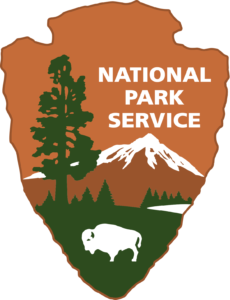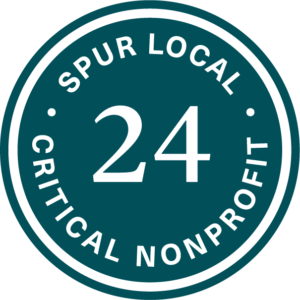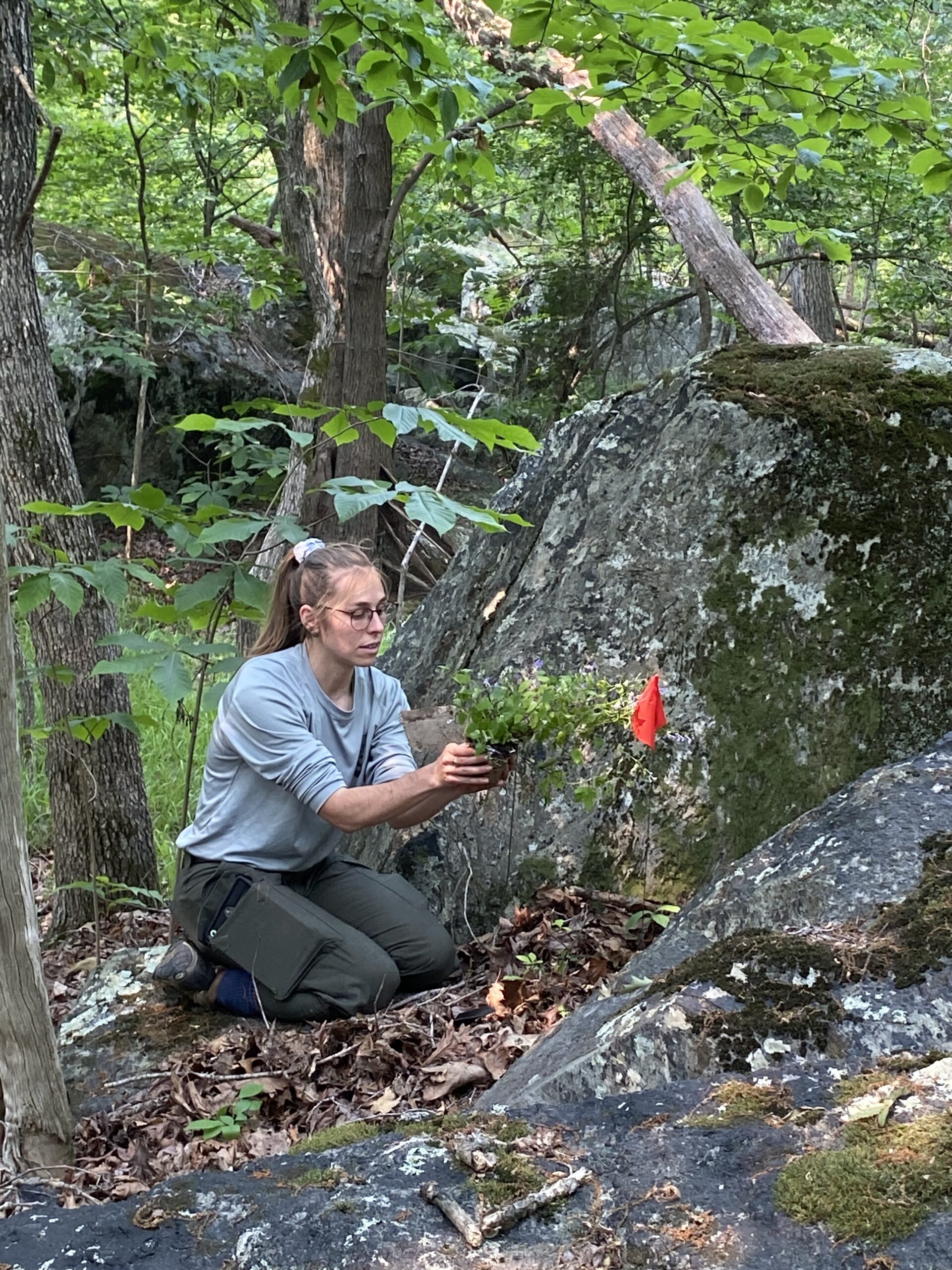
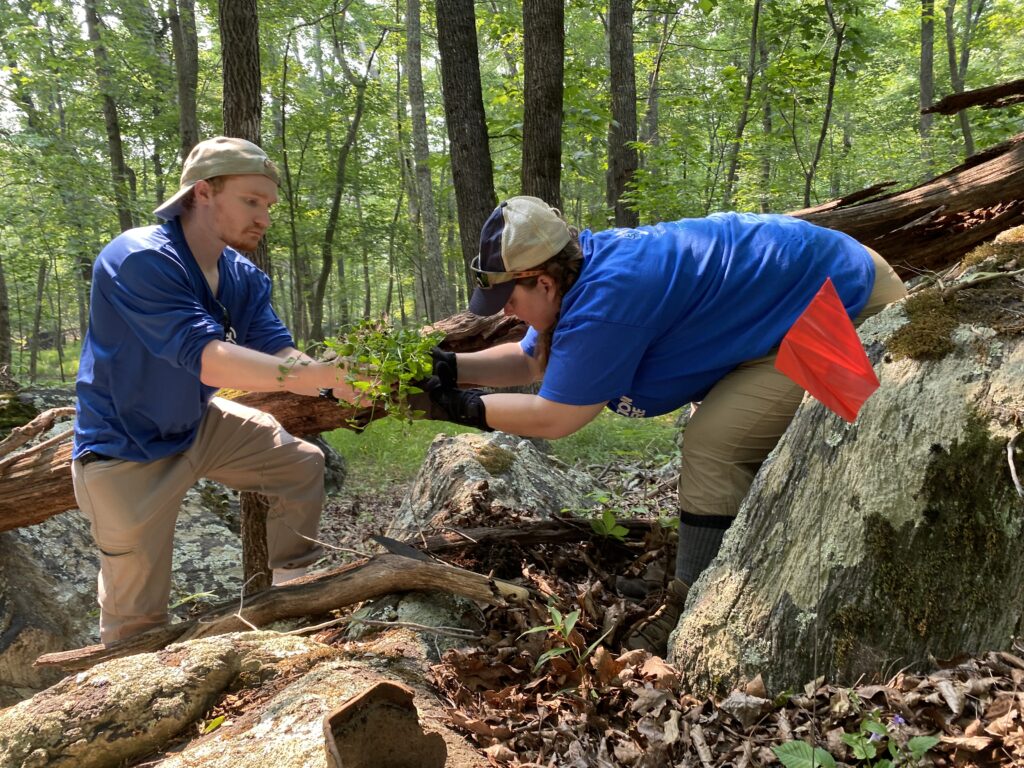
Student Conservation Association interns planting smooth rock skullcap at a site in the Potomac Gorge area. Photo by C&O Canal NHP/NPS.
The C&O Canal National Historical Park (NHP) is focused on the long-term conservation of rare, threatened, and endangered (RTE) plant species throughout the Park. Its comprehensive strategy to conserve these plants includes identification, monitoring, habitat protection, seed collection, plant propagation, and establishing new populations of RTE species in unique habitat niches in the Park. That strategy has recently come full circle as the first several hundred plants from five species of RTE plants, processed and propagated from collected seeds, have been outplanted into appropriate habitats in the Park.
Since the creation of the C&O Canal NHP in 1971, over 1,500 plant species have been identified. More than 200 RTE plant species have been recorded, some of which are globally rare and unique, however, that number appears to be dwindling, and many species are likely now locally extinct. Invasive non-native plants, regional urbanization, and surging visitation have all taken their toll on the fragile habitats that make such diversity possible. The C&O Canal NHP has faced additional challenges as a result of ongoing shortfalls in the National Park Service operating budget. Through the generosity of over 70 individual donors, the C&O Canal Trust has assisted with funding this critical biodiversity initiative since 2020.
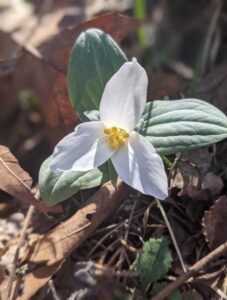
Snow trillium (Trillium nivale), an early spring woodland perennial found in the C&O Canal NHP. Photo by C&O Canal NHP/NPS.
While the C&O Canal Trust has been a philanthropic partner to help fund conservation efforts, Mt. Cuba Center in Hockessin, Del., has been an important partner in propagating seeds of RTE plant populations collected in the Park. The nonprofit botanical garden maintains an extensive collection of trillium and ongoing research programs dedicated to the conservation of the plant. Mt. Cuba Center partnered with the C&O Canal NHP when trying to expand its trillium collection to include snow trillium (Trillium nivale), a highly state-rare endangered plant species in the Park.
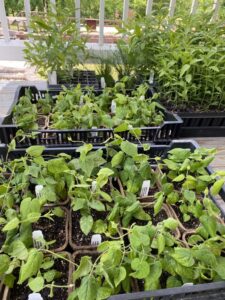
Propagated material received from Mt. Cuba Center in May. Species in image include limerock milkvine (Matela obliqua) and tall tickseed (Coreopsis tripteris). Photo by C&O Canal NHP/NPS.
Snow trillium brought Mt. Cuba Center and the Park together, and eventually, conversations began about Mt. Cuba Center propagating rare plants from the Park in their greenhouses. Resources staff collected 16,000 seeds from 16 different RTE plant species in 2022 and sent those to Mt. Cuba Center for processing and propagation. The Park received several hundred plants from five RTE plant species in May of 2023, and those plants were outplanted into appropriate habitats in the Park, primarily in the Potomac Gorge area. Those species included tall tickseed (Coreopsis tripteris), limerock milkvine (Matelea obliqua), smooth rock skullcap (Scutellaria saxatilis), largeflower valerian (Valeriana pauciflora), and flatstem spikerush (Eleocharis compressa).
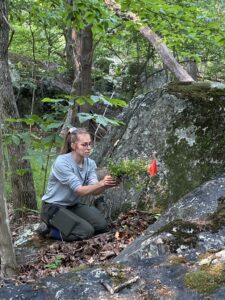
C&O Canal NHP resources staff member planting smooth rock skullcap at a site in the Potomac Gorge area. Photo by C&O Canal NHP/NPS.
More outplantings from the 11 remaining RTE species will be done throughout the growing season as plants mature and are available from Mt. Cuba Center. So far in 2023, seeds from five additional species have been collected, which include harbinger of spring (Erigenia bulbosa), Carey’s sedge (Carex caryana), eastern leatherwood (Dirca palustris), white trout lily (Erythronium albidum), and eastern shooting star (Primula media). Collection from additional species is planned as plants produce fruits and seeds throughout the growing season.
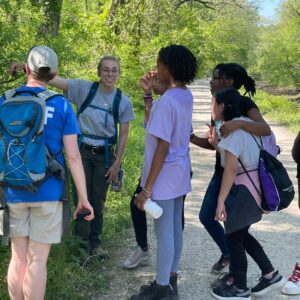
C&O Canal NHP resources staff member Sarah Brown leads Canal For All group Community Bridges on a nature walk in Potomac. Photo by Community Bridges.
Park resources staff are also exploring the effects of invasive species on RTE plant species. The Park is implementing a comprehensive plan for the removal of invasives that are putting RTE plants at risk. In addition to their important work in the field, resources staff have been educating various groups about RTE plants and invasives, including Trust Canal for All partners like Community Bridges.
The C&O Canal Trust launched the C&O Canal Biodiversity Campaign in 2022, with the goal of raising $75,000 in 2022 and 2023. Due to overwhelming support for the project from our canal community, the Trust raised $130,000. Make a gift today, and ensure the C&O Canal NHP is able to continue work to help protect this national biodiversity treasure. Together we can make a difference and help the Park conserve these plants for future generations.
For more information, please contact our development team at [email protected].

Harbinger of spring, eastern shooting star, and white trout lily. Photos by C&O Canal NHP/NPS and Trust staff.

